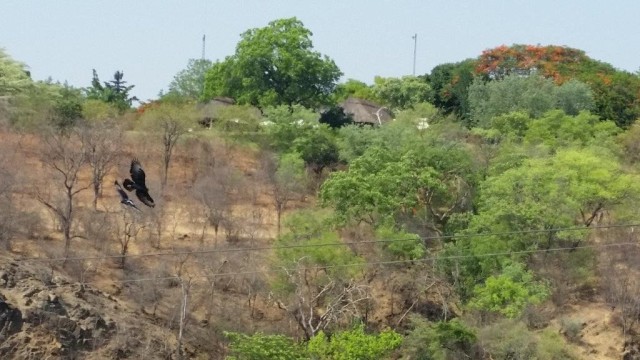
Anyone who has visited Victoria Falls, intends to visit Victoria Falls or has an interest in visiting this seventh wonder of the world will by now probably have heard of the increasingly popular Lookout Café. It is well known and popular for a number of reasons ….. its delicious food, its stunning location above the Batoka Gorge and its friendly staff to name but a few. Diners at the Lookout Café can observe adrenaline junkies flinging themselves off the gorge on one of the many Wild Horizons High Wire activities, watch the Zambezi River surging below or take in the magnificent spectacle of the Batoka Gorge. What many people don’t realize is that there is also a wonderful opportunity to see Verreaux’s Eagle (also known as the Black Eagle in Southern Africa). This is a great treat for anyone with even the slightest interest in ornithology. This very large eagle (the 6th longest in the world) can often be seen swooping and gliding over the craggy rocks of the gorge in search of hapless hyraxes.
To those who are not too familiar with this magnificent bird of prey, Verreaux’s Eagle is one of the most specialized species of raptors. These birds typically live in hilly and mountainous regions of Southern and Eastern Africa, including our very own Batoka Gorge. The distribution and life history of these birds revolve solely around its favorite food, rock hyraxes, or ‘dassies’ as they are known as locally. When hyrax populations decline Verraux’s Eagles have been known to survive with mixed results on on other species, but considering their highly specialized tastes they have survived the test of time exceptionally well in terms of keeping up their numbers! Their successful survival rate can also be attributed to the fact that they prefer to live in rugged and remote areas. Fortunately it is difficult for humans to destroy rocks and mountains and these areas are generally not favorable to humans so the areas in which these Eagles live have stayed relatively unchanged!
Unlike other eagles with their haunting cries, Verreaux’s Eagles are largely silent, giving no clue to their prey about their whereabouts. The first indication of the presence of one of these incredible Eagles is a flash of black or an ominous shadow cruising past in your peripheral vision. These birds will often hunt in low level flight and catch the rock hyraxes in a fast, twisting dive a few seconds after ‘surprising’ the hyrax. Interestingly, cooperative hunting has also been seen with one eagle in a pair flying past and distracting the prey while the other strikes from behind. ‘Dassies’ are so well camouflaged in their natural environment that we often all we see of them is a brief flash or fur but these Eagles can fly out and return with a kill in just a few minutes.
So the next time you are sitting and relaxing over a delicious meal at the Lookout Café bear in mind that you are in the heart of Verreaux Eagle country. Keep watch amongst the craggy rocks and in the lower levels of the gorge for this large black eagle with its trademark white ‘V’ mark on its back and listen for the silent whoosh of its enormous wings as it too seeks out its own specialized lunch! Written by Libby White









 Long Crested Eagle
Long Crested Eagle Black Crowned Night Heron
Black Crowned Night Heron Hooded Vulture
Hooded Vulture Black Winged Stilt
Black Winged Stilt African Skimmer
African Skimmer Grey Headed Gull
Grey Headed Gull Rock Pratincole
Rock Pratincole Yellow Billed Kite
Yellow Billed Kite